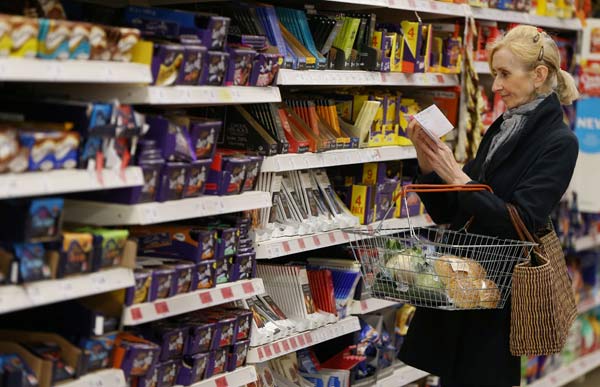UK consumers spend a bit more in August, 2017 still seen weak
 |
|
A shopper checks her shopping list in a supermarket in London, Britain April 11, 2017. [Photo/Agencies] |
LONDON - British consumers stepped up their domestic spending last month for the first time since April, as more of them holidayed at home due to the Brexit hit to the pound, payment card company Visa said on Monday.
But Visa said this year still looks like being the weakest for spending since 2013, as households struggle with rising inflation in the wake of last year’s referendum decision to leave the European Union and weak wage growth.
Consumer spending, the engine of the British economy, last month rose 0.3 percent compared with August 2016 on an inflation-adjusted basis, Visa said based on its credit and debit card transaction data.
“We are wary about taking this as a sign that the household squeeze is easing given the clear slowdown in spending during the preceding three months,” Kevin Jenkins, Visa’s UK managing director, said.
In July spending fell 0.8 percent year-on-year, and in August spending on transport and communications fell for the eighth consecutive month as Britons shied away from big-ticket items such as car purchases and air travel, Visa said.
But consumers were paying more to have fun, probably reflecting the growing number of people taking their holidays in Britain due to the fall in the value of sterling since the Brexit vote, Visa said.
The rise in inflation caused by the weaker pound has weighed on British consumer spending since early 2017, leaving the Bank of England hoping that a pickup in exports and investment might offset the hit to the broader economy.
But accountancy professional body ICAEW said it expected capital spending by companies would fall by 1.1 percent next year in a set of forecasts published on Monday.
“Without this investment, growth will continue to slow, especially as we can no longer rely on consumers to keep spending at the rate they were,” Michael Izza, ICAEW’s chief executive, said.
ICAEW said it expected Britain’s economy to grow by 1.6 percent in both 2017 and 2018, 0.8 percentage points slower than the average for the past three years.




























